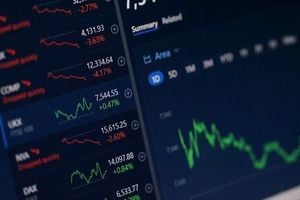DeepSeek, a Chinese AI start-up, has made waves across global markets following its surprise emergence as a potent competitor to established players like OpenAI and Nvidia. Launched on January 29, 2025, this Hangzhou-based company has quickly gained significant traction with its advanced AI chatbot capabilities, drawing comparisons to the historic "Sputnik moment" for the technology sector.
The advent of DeepSeek has proven disruptive, particularly for U.S. tech firms, as its rapid uptake triggered steep declines on Wall Street, erasing approximately $1 trillion from the value of AI-related companies within hours. Notably, Nvidia experienced the largest single-day loss in corporate history, dropping nearly 17% from its stock value, which translates to around $600 billion lost.
DeepSeek’s founder, Liang Wenfeng, previously known for his work on quantitative trading, heads up this innovative company, which operates with much lower costs than its competitors. Reports indicate DeepSeek managed to accomplish what many had thought impossible: developing highly sophisticated AI models with training expenses hovering around just $6 million, as opposed to $80-100 million typically cited by other leading developers.
This innovation significantly challenges the status quo. With U.S. tech giants mobilizing resources to analyze DeepSeek’s approach, as evidenced by Meta CEO Mark Zuckerberg organizing four separate engineer teams to investigate, the urgency behind their response is palpable. The expectation has always been to rely on massive investments within the sector, but DeepSeek’s success indicates otherwise. The presence of less experienced graduates within its ranks, working around high-level export restrictions, has allowed DeepSeek to thrive where traditional models have faltered.
DeepSeek’s innovative technical strategies hinge on the mixture-of-experts (MoE) architecture, which activates only the necessary components for each task, allowing for enormous reductions in computational demand. This efficiency begs the question: could this mark the dawn of new technological strategies, wherein software outweighs hardware dependence?
Political reactions have been swift. Former President Donald Trump described DeepSeek as a wake-up call, insisting U.S. industries must intensify their focus to compete effectively. Legislation has also been introduced, with politicians like Rep. John Moolenaar expressing concerns over national security risks posed by Chinese advancements. Their sentiments signal growing unease within U.S. legislative circles, evident from explicit warnings to avoid utilizing DeepSeek technology within governmental operations.
Critics point to potential risks associated with data privacy, highlighting the unsettling reality of DeepSeek’s data storage, which includes user information retained on Chinese servers. Industry experts have also gleefully echoed this need for caution, emphasizing how the centralization of data and its accessibility could pave the way for surveillance threats.
Despite the anxieties, the broader ramifications might usher in opportunities for burgeoning start-ups across Australia and around the world. Investors are reshaping perspectives, now considering AI models aimed at cost reduction rather than merely throwing money at complex challenges, indicating the importance of more efficient approaches to AI adoption.
James Cameron from AirTree sees renewed vigor for local innovations, asserting DeepSeek’s impact could spur Australian firms forward as foundational AI models become more affordable. The democratization of AI technology may pave the way for increased inventions among lesser-known startups.
Interestingly, newly-imposed scrutiny instigated scrutiny of DeepSeek. Some industry figures question the veracity of the technology's low training costs, prompting speculation about the potential for significant hidden expenses. Critics draw attention to several inherent issues with DeepSeek's service—83% failure rates on accuracy tests conducted by NewsGuard suggest the model's reliability remains largely unproven even as it surged to the forefront of public usage.
The competitive pressures on DeepSeek extend to domestic challenges within China as major players like Alibaba have now entered the fray, launching alternative AI models amid fears of falling behind. Market competition intensifies as Chinese tech firms scramble to keep pace with DeepSeek’s rapid growth.
While on the surface, DeepSeek may offer the solution to the high-cost AI scalability Concerns over user data privacy, potential competitive theft, and geopolitical ramifications proliferate, urging global vigilance. The true costs associated with nurturing this advanced technology may also transcend mere financial assessments, shifting the narrative toward broader political discussions surrounding data security and AI's role on the world stage.
DeepSeek's arrival marks pivotal change—what once appeared akin to a monolithic technological environment is now characterized by unexpected players with capabilities to disrupt established norms. The coming years will determine whether Western AI firms can adapt or face sustained challenges as they navigate the complex intersection of innovation and geopolitical dynamics.



